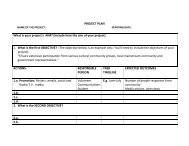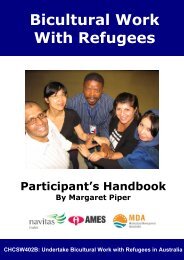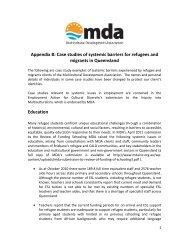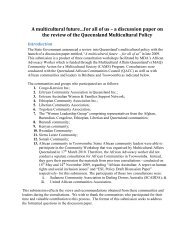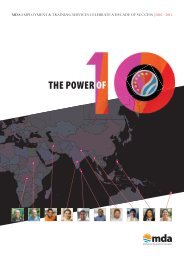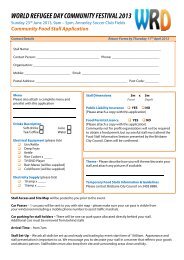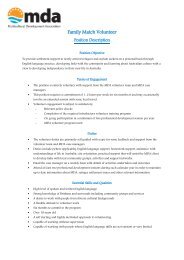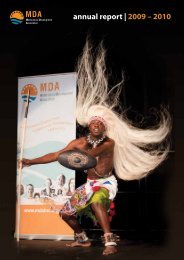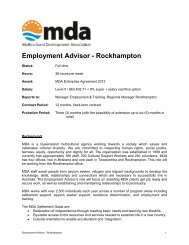Settlement Works - Stories from Rockhampton - Multicultural ...
Settlement Works - Stories from Rockhampton - Multicultural ...
Settlement Works - Stories from Rockhampton - Multicultural ...
Create successful ePaper yourself
Turn your PDF publications into a flip-book with our unique Google optimized e-Paper software.
ALI ABBAS REZAI<br />
I<br />
was born in Logar, Qarbagh, Ghazni,<br />
Afghanistan in a time of war. I was<br />
the middle child between my sister<br />
and brother. During that time, the Soviets<br />
were occupying Afghanistan and my father<br />
had to serve in the army for two years.<br />
When he returned, he owned a shop in<br />
the city. After the Soviets left Afghanistan,<br />
the Taliban took over. They believe that<br />
Hazara people are infidels, and things<br />
became very dangerous for us.<br />
My father was executed by the Taliban<br />
when I was 14. He was killed because he<br />
was Hazara and a shop owner. My mother<br />
went to a friend of my father for help to<br />
flee. At this time, many Hazara people<br />
were leaving Afghanistan for Pakistan<br />
and Iran. We went to Quetta in Pakistan.<br />
There was already an established Hazara<br />
population in Quetta <strong>from</strong> 200 years<br />
before. They had fled there because of<br />
persecution by Amir Abdul Rahman an<br />
Afghani King who committed genocide<br />
against the Hazara people. So you can see<br />
how Hazara people have never known<br />
peace.<br />
For five or six years the situation in<br />
Quetta was good. People were so friendly<br />
and helped us a lot. I worked to take care of<br />
my family selling clothes and then, when<br />
I was 16, loading and unloading trucks.<br />
There was always a threat <strong>from</strong> outside,<br />
and we were only able to mix with our own<br />
people, but at least we were safe. That was<br />
until 2004 when the first bomb blast went<br />
off in Quetta. After the Americans invaded<br />
Afghanistan, many of the Taliban people<br />
came to Pakistan to hide and started to<br />
carry out target attacks in Quetta. Things<br />
began to become bad for us again.<br />
In 2008 I met my wife. After I<br />
finished my work each day I would go to<br />
English classes <strong>from</strong> 6 pm to 7pm. I was<br />
so embarrassed when I was young and too<br />
shy to talk to women. So it was four or five<br />
months before I actually spoke to her. I<br />
had made a plan to get her phone number<br />
and call her on the phone to speak—that<br />
way I would not be too ashamed to talk.<br />
In my culture you do not ask for<br />
approval to be married, so when my<br />
mother approached me and asked me<br />
what my plans for the future were I was<br />
delighted. She met with my future wife<br />
and not long after we got married. We<br />
now have a beautiful son named Farhan<br />
Ali Rezai.<br />
Apart <strong>from</strong> this happiness, life in<br />
Quetta was becoming more and more<br />
dangerous. All over the walls in the street<br />
graffitti was written, saying that Shia<br />
people should be removed—that Hazara<br />
people were not welcome in Pakistan<br />
anymore. So I returned to Afghanistan<br />
to see what the situation was like there. I<br />
thought perhaps my family could return<br />
home. But things were worse there. So I<br />
returned to Quetta and spoke with my<br />
family about what we should do. My wife<br />
did not want me to leave, but my mother<br />
was sure that it was the best option for<br />
us. She said she could not bear to see her<br />
son killed in front of her. There was a big<br />
risk that this may happen as the attacks<br />
targeted men. I needed to stay alive to<br />
take care of my family, so I took the long<br />
journey to seek asylum.<br />
In Quetta I played football with a<br />
guy called Lucky. Lucky and I kept in<br />
touch through Facebook while I was in<br />
detention. He told me that he had found<br />
good work for refugees in a town called<br />
<strong>Rockhampton</strong>. When I was granted my<br />
permanent visa I moved to <strong>Rockhampton</strong><br />
as quickly as I could and have been here<br />
ever since. I love living here, because<br />
whenever I get sad or miss my family<br />
I have my friends here to cheer me up.<br />
They understand what I am feeling and<br />
help me. On Saturdays we go to the beach<br />
together, to Yeppoon or Emu Park and<br />
have a BBQ. When I was in Brisbane<br />
I heard people talking about the Gold<br />
Coast. I have never been there, but I think<br />
that Yeppoon would be a much better<br />
place. On Sundays we all go shopping to<br />
get our food for the week, but then try to<br />
rest as much as we can because we know<br />
we have work on Monday.<br />
“<br />
The Burmese guys who live<br />
with us are so friendly. They are<br />
refugees too and they understand<br />
what our lives have been like, so it<br />
is easy for us to get along. We sit<br />
together and eat and drink tea<br />
together. They are really funny<br />
”<br />
guys.<br />
SETTLEMENT WORKS | STORIES FROM ROCKHAMPTON 3



